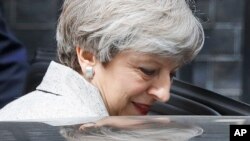British Prime Minister Theresa May will begin the delicate task of running a minority government on Wednesday by setting out a softer tone on Brexit as Queen Elizabeth formally opens parliament.
What is usually a ceremonial address, dominated by costumed pageantry, has become a critical test of May's ability to run the country during its most testing period in generations.
The so-called Queen's Speech, prepared by ministers and read out by the monarch, will spell out the policies May's government intends to pursue over the next two years.
It comes at a time of unprecedented political flux with May yet to secure a deal to prop up her government after a botched snap election left her short of a majority.
Lawmakers will have to approve the speech in a vote, expected next Thursday, that will be a de facto vote of confidence. Minority governments are a rare occurrence in British parliamentary politics where the nature of the electoral system usually produces a governing majority.
May's authority is badly damaged as Britain begins negotiations on leaving the European Union. Four militant attacks have questioned her grip on national security, and the death of at least 79 people in a tower block fire has become a flashpoint for public anger at her party's record in government.
"The election result was not the one I hoped for, but this Government will respond with humility and resolve to the message the electorate sent," May said ahead of the speech. "First, we need to get Brexit right. That means getting a deal which delivers the result of last year's referendum and does so in a way that commands maximum public support."
The speech is expected to set out a raft of new laws needed to implement Brexit, plans to strengthen counter-terrorism powers and a series of bills designed to reform Britain's infrastructure and economy in preparation for life after the EU.
After facing intense pressure to soften her Brexit plans since the election, May promised to consult widely.
"While this will be a Government that consults and listens, we are clear that we are going to see Brexit through, working with Parliament, business, the devolved administrations and others to ensure a smooth and orderly withdrawal," she said.
Her plans will need the support of Northern Ireland's Democratic Unionist Party (DUP), which is expected to use its 10 votes to back her in exchange for more funding to the province, policies geared towards boosting its economy and assurances that Brexit will not cut it off from the neighboring Irish Republic.
But that deal has yet to be announced nearly two weeks after a national election which May had called in a bid to strengthen her majority, but which ended up weakening her grip on power.
Day of rage
The extent of May's diminished status will be visible both inside and outside parliament.
Outside the gates of Westminster Palace the outcry over a deadly tower block fire in a deprived estate nestled in one of London's richest boroughs will manifest in a 'Day of Rage' protest which blames the incident on social inequality and years of public spending cuts.
"Lets make 21st June, the day of the Queens speech A DAY OF RAGE, a day we shut down London, a declaration that there will be no peace until this government is brought down," event organizers the Movement for Justice By Any Means Necessary said in a post on Facebook. Hundreds of people were due to attend.
Inside the building, the Queen will deliver a legislative agenda shorn of some of May's flagship policies - most notably a proposal to make the elderly pay more towards their care costs which was blamed for alienating core voters at the election.
Instead May's program for government will be restricted to the technical work of making sure Brexit can happen: a bill that sets out how the government will transpose huge swaths of EU law into British law. The government set out details of this 'Great Repeal Bill' in March.
In addition, May is expected to stress the need for intelligence agencies to have more powers to investigate and stop militant plots - a pledge she made in the wake of recent deadly Islamist attacks in London and Manchester.
Those plans could also deliver on May's repeated promise to make internet firms more accountable for the spread of extremist material online. Additional bills on housing and transport policy are anticipated.





